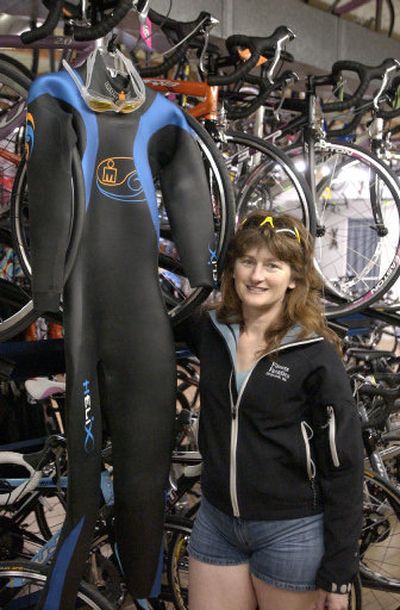Hooked on triathlon

It may come as a surprise to the triathletes who seek Robin DeRuwe’s advice, but at first the owner of Fitness Fanatics didn’t think the sport was for her.
Before embarking on a long string of triathlons, including three Ironman Triathlon entries, DeRuwe spent the better part of a decade dodging the swim-bike-run sport with which she is uniquely identified.
“I opened my shop in 1990 and we didn’t do triathlon stuff back then,” she explained. “We were more into in-line skates and cross country skis and stuff like that. Customers were always saying to me ‘Robin, you should do a triathlon.’ I kept saying ‘I don’t swim.’ It wasn’t that I didn’t swim, I just didn’t swim competitively.”
But, DeRuwe and triathlons are a match that couldn’t be denied.
“Finally, in 1999 one of my friends talked me into going up and doing Lake to Forest, a mountain bike triathlon that doesn’t exist anymore,” DeRuwe said. “She didn’t have anyone to go do it with her and I agreed to go – three days before the event. It had a quarter-mile swim. I figured I could probably dog-paddle or side-stroke well enough to make it that far.
“I was one of the last people out of the water. I passed a bunch of women on the bike, passed a bunch more on the run and ended up 15th overall and won my age group. And I was hooked.”
Hooked puts it mildly.
DeRuwe’s shop, at 12425 E. Trent Ave., is a hub for triathlon equipment and information for a sport that is finally shedding its ‘extreme sport’ reputation.
“It’s funny,” she said. “I don’t consider triathlons an extreme sport. I consider it to be more of a mainstream sport. I see so many people coming into it all the time. It’s for everybody, not just people who are looking for that really out-there kind of thing.”
In the mind of many, triathlon is forever linked with the sport’s granddaddy event, the original Ironman on Hawaii’s Big Island. The race is grueling – a 2.4-mile swim in Kailua-Kona Bay, a 112-mile bike ride across ancient lava fields followed by a marathon along the coast.
The Ironman makes for thrilling television – pictures of exhausted athletes weaving toward the finish line are indelible. But at the same time, it’s branded the sport.
“When people hear the word ‘triathlon,’ they assume you’re talking about the Ironman,” DeRuwe said. “Not everyone realizes that there are these smaller events that aren’t as overwhelming.
“They don’t realize that this is a sport you can take on as a team. If you go out for an hour walk regularly, you can probably handle the (three-mile) run leg of a sprint triathlon because you don’t have to run it – you can walk it. You can have a friend who rides their bike for exercise do the bike leg. Same with the swim leg. Anyone who does one of those three activities can put a team together and compete at a triathlon.”
DeRuwe said she’s spotted signs that the sport has finally entered the mainstream.
“I always know a sport has made it into the mainstream when you see it on advertisements,” she said. “You see commercials for everything, and they feature people doing triathlons. That’s like the big boom in in-line skating. At a certain point you started to see people skating in commercials. On the front of the Wheaties box now we even have a pro triathlete.”
DeRuwe has done more than preach the sport to all who will listen, she helped put together one of the most successful events in the Spokane Valley – the Valley Girl Triathlon.
“Marla (Emde) and I had been talking for a while about bringing a women-only triathlon to the area,” DeRuwe said. “We talked about names and batted around a few ideas. Then someone suggested Valley Girl. I wish I could take credit for it, but it wasn’t me. It was the perfect name for it because it encapsulated everything we were hoping the race would be.”
The race started in 2004 and by the second year was an early sell-out. Because of space restrictions in Liberty Lake, the race is capped at a maximum of 550 entrants. That number was reached in mid-winter for the annual July race.
The same is true for this year’s race, which will be July 15.
Emde’s newest sprint event, the West Plains WunderWoman Triathlon, Aug. 19 at Medical Lake, also is sold out.
The idea for Valley Girl was to design a women-only triathlon that would support and encourage first-timers and be a gateway race, a starting point for athletes on their way to bigger races.
The race fulfilled all of those goals right from the beginning.
“The first morning Marla and I were standing on the beach and everyone is lined up for the start. There were all these families there to support their wives or their daughters or their mothers or their sisters. We really didn’t anticipate the crowd to be like that. We wanted it to happen, but we really didn’t anticipate it. We looked at each other and said, ‘Oh my gosh – look at all these people! It’s just like we wanted it to be!’ All day long we were saying to one another ‘It really worked! It really worked!’ It was just so much fun and more than we had ever hoped for.
“That first year we wound up being a little short of volunteers. We had people coming out of the crowd saying ‘I can do that for you.’ It was incredible.”